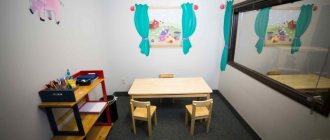- It would be great if there was such a list of four points, you follow it and your child studies well. But there are no universal recipes for preparing a child for school,” Natalya Klimova, a pediatrician of the highest category, allergist-immunologist and head physician of Blagoveshchensk Kinesio, immediately began a conversation with Amurskaya Pravda.
But still, Natalya Viktorovna adds, parents of a future student should establish certain rules at least a year before school if they are not already in the family. These rules relate to nutrition, life, routine and disease prevention.
“A child must go to first grade from the age of 7. Parents often try to send their children to school both at age 6 and at less than 6 years old. This is wrong.”
“It’s unlikely that you can change anything radically in one year.” But we must understand that the basis of health for a child is rational nutrition from birth, an organized life, an organized daily routine, and proper prevention of various chronic diseases. This includes physical therapy, timely vaccination, and sanitary and hygienic standards. Teach your child to wash his hands, wash his face, and brush his teeth before school, the doctor advises. “Even family relationships affect the child’s health. He will be calmer and more adequate if he has a calm atmosphere at home.
The whole family should accept new habits; creating special conditions only for the child is ineffective, the pediatrician believes.
— Instill a culture of nutrition in your family. The child should have breakfast before leaving the house. Breakfast is one of the most important meals, especially for a schoolchild who will be actively engaged in the first half of the day, recommends Natalya Klimova. — Of course, it shouldn’t be sausage. Preferably porridge, and not necessarily milk porridge. Follow the known and simple rules. A boiled egg is better than a fried one, and fresh pancakes fried without oil are better than a store-bought convenience product.
A year before school, the child must undergo a medical examination. You shouldn't ignore it, even if nothing bothers you. Subject specialists will appreciate the physical and neuropsychic development of the future first-grader, because in many respects his academic success will depend on his health.
You can easily make sure that your child’s development before school is going as it should - by bringing him to a speech therapist. After all, this specialist not only teaches you how to pronounce sounds correctly. A baby’s speech directly depends on his level of development. A child will not construct a beautiful, detailed sentence if he does not have a broad outlook for his age and a rich vocabulary. A speech therapist will help you find out exactly where something went wrong with your speech.
— Every year a large number of children come to us who have learning difficulties. When you begin to examine these children, it turns out that the main reason for school failure is that in the first grade they are not ready to perceive educational material, analyze it and reproduce it. This is often associated with speech disorders,” says Galina Yakimishina, speech therapist of the Central Psychological, Medical and Pedagogical Commission at the Institute for Educational Development of the Amur Region. — If the child does not pronounce some sounds, then the parents believe that this is a speech problem and turn to a speech therapist. But it also happens that a child pronounces all sounds correctly, but he has difficulties in distinguishing sounds that are similar in sound. He cannot reproduce complex words, for example, “excavator operator,” “tractor driver,” “ballerina,” and so on. Cannot distinguish the first sound in a word and the last. He uses words incorrectly, cannot construct a detailed sentence, and cannot paraphrase. And these are all the skills that are necessary for learning, especially in the Russian language. Moreover, these speech problems, one of which is misunderstanding of spoken speech, are the cause of failure in mathematics! After all, the child simply does not understand what the teacher says when he explains new material.
School is stressful, doctors say: in kindergarten the child moved a lot, but in class he will have to sit.
Experts note: now you rarely meet a child who does not require the help of a speech therapist. Moreover, the problem can make itself felt at any age. “The parents of a 16-year-old teenager contacted me. At one time, the defect was not noticed, but now the child cannot enter flight school because he has a throaty pronunciation of the sound “r,” says the speech therapist.
— When I graduated from college, a kindergarten for children with speech disorders had just opened in Blagoveshchensk, and then another one. Now such kindergartens can be opened everywhere. A speech therapist is needed in almost every kindergarten,” says Galina Rodionovna, who has 28 years of experience. — There are a lot of children who pronounce all the sounds, but they are given a speech therapy conclusion “general speech underdevelopment.”
Often, future first-graders have accumulated a small stock of ideas about the world around them. They don’t know the surname, first names and patronymics of their mothers and fathers, where they work. “They don’t know the date of their birthday, not to mention the age of their mother and father,” states Galina Rodionovna.
“Children have such fragmented ideas about the world around them that if you ask a child whether he knows the animals of hot countries or the north, he will be confused. But this is preschool age and all this should be formed through communication with parents, watching the right TV shows, reading the right literature, including encyclopedias. These are all the reasons for school failure, warns the speech therapist. — In the first grade, grades are not given; it turns out that a child who has not sufficiently mastered the first grade program moves to the second when his school motivation decreases due to failure in the first grade.
School is stressful for a child, orthopedic doctors say. After all, in kindergarten he moved actively, but in the classroom he will have to sit a lot.
- First of all, pay attention to how the child sits on the chair. Does he know how to use the back of a chair, how he positions his body relative to the seat, back and table at which he will write and read, advises orthopedic traumatologist and chiropractor Evgeniy Kvitkin. — Ideally, the position should be such that there is an obtuse angle between the torso and the thigh, that is, you need to sit slightly reclined, there should be lumbar support so that the lower back does not sag, but has a little support. Then blood circulation in the groin area, where the main blood vessels pass, will not be disrupted.
Amur doctors and teachers state that more and more children are going to school with spinal curvature.
“The fact that scoliosis (a persistent lateral deviation of the spine from the physiological straight position) is often diagnosed in preschool children is associated with the modern pace of life,” says pediatric orthopedist and chiropractor Dina Zaikina. - This is the availability of gadgets, sitting for long periods in front of television due to the mass of attractive children's channels. In a word, long-term physical inactivity. And parents simply “lack” time for their children.
Often, poor posture is associated with another disorder - vision, notes Evgeny Kvitkin. Therefore, visiting an ophthalmologist is also a must in preparing for school.
— If a child has poor vision, he intuitively reaches forward and bends the upper spine. We must immediately determine how the child is visually prepared for school,” advises Evgeniy Anatolyevich. — Posture is not only an orthopedic problem. Vertical posture is controlled by three organs - the spine with the feet, the vestibular system and the eyes. All three systems connect with each other, and we, accordingly, choose one or another form of posture control. All these organs need to work well together.
“It is not easy to detect scoliosis in the early stages, because the deformation is visible only when the back muscles are tired, and disappears after rest,” warns Dina Feliksovna. — Subsequently, the curvature is constantly observed, the patient’s posture is disturbed, the shape of the chest, shoulder blades and shoulders are at different heights. As the disease progresses, the mobility of the spine decreases significantly, physical activity brings pain, and at this stage children often complain of neurological pain.
— School maturity occurs at the full age of 7 years. It is from this age that the child should go to first grade. Parents often try to send their children to school both at age 6 and before age 6. This is wrong. An exception can be made only for September-October children. If you have problems with speech, then all the more it’s worth waiting until the full 7 years, there’s nothing wrong with that,” says Antonina Fomina, head of the neurological department of the Blagoveshchensk Children’s City Clinical Hospital.
Before school, children must undergo an examination by a neurologist; sometimes it is necessary to contact a specialist in advance. There are often problems with blood flow, so we send patients for additional examination. At school, a child picks up a pen and feels tension between his hand and shoulder. This then causes headaches. In this case, we prescribe an ultrasound of the main arteries of the head. Some will benefit from a massage, others will need a more in-depth examination.
Neurological problems in children at school will result in decreased academic performance, behavioral problems, and restlessness. Children have generally become more active. Now is the era of hyperactive children. They will move the world. Therefore, activity is not yet a pathology, but pay more attention to raising a child. It plays a major role in ensuring that an active child can sit and listen to the teacher.
“Give future schoolchildren multivitamins. Far Eastern children are recommended to take them year-round,” advises pediatric neurologist Antonina Fomina. Pediatrician Natalya Klimova shares the same opinion, but recommends choosing not synthetic drugs, but natural vitamin complexes or dietary supplements.
— Any good rules are extremely rarely feasible due to various circumstances. Don’t set yourself super-goals when you create pleasant conditions for your child, but at the same time break your biorhythms,” advises pediatrician Natalya Klimova. — My unspoken rule is no fanaticism. In order for a child to grow up happy, healthy and literate, it is necessary that parents also lead such a lifestyle - happy, healthy and literate. And it doesn’t matter whether the child goes to kindergarten, school, or college. If a microclimate and all the conditions are created in the family so that the personality develops harmoniously both physically and psycho-emotionally, then, I think, the child will experience all these moments of transition much better.
Modern parents strive to send their children to development centers and clubs. In classes, teachers teach preschool children to read, count and write. But much of what children receive there can be given by the parents themselves. The main thing is to talk with the child, say primary school teachers. This will help the future first-grader expand his vocabulary, learn to express thoughts and retell, for example, events that happened to him during the day, or a cartoon he watched. This skill - retelling - will be useful to him at school throughout all 11 years of study.
“In order for your child to study well, start training his memory before school,” advises Olga Sergienko, a teacher with 36 years of experience, a primary school teacher at Blagoveshchensk Lyceum No. 6. - Learning just a poem is not enough. Do training exercises in a playful way. For example, show your child pictures - first five of them, close them and check how many he remembers. Gradually increase the number of pictures to 10; this is acceptable for a 5-6 year old child. It’s good if he remembers half or more. This way you will train his visual memory. To develop auditory skills, instead of pictures, name the objects that you see when, for example, you walk home from kindergarten. Five words are enough. If a child names four, that's already good. In class we write dictations, I read four-word sentences. Some children cannot remember, they have to dictate one word at a time.
“We write dictations, I read four-word sentences. Some children cannot remember, they have to dictate one word at a time.”
Olga Kalinovna advises parents of future schoolchildren to read more children's books and fairy tales - at least 30 minutes a day. And even more often, take walks and go to the forest together. “After all, it is not only good for health, but also very educational. Willy-nilly, parents will have to answer numerous questions from the baby. This is again a replenishment of vocabulary, development of attention and conversational speech,” says the teacher.
It will be useful to practice perseverance with your preschooler. After all, a teacher will need at least 20 minutes to explain new material to a student in class.
— I advise the parents of my students: record the time how long the child can sit and carefully watch some TV show - not a cartoon. How long can he look at a children's magazine? Usually 5-7 minutes - and this is very little! - says Olga Sergienko. — Collect puzzles with your child, play board games, teach him to concentrate.
- Nadezhda Kozhevnikova
Logical thinking, mathematics
The future schoolchild should be able to solve logical problems and examples of addition and subtraction in mathematics (within 10).
A preschooler should:
- It is good to know the composition of numbers within the first ten;
- be able to compare quantities;
- solve examples of addition and subtraction and solve problems involving these operations;
- know geometric shapes
- It’s good to navigate on a sheet of paper in a box, making a drawing according to the boxes (focusing on such concepts as “2 boxes to the left”, “1 box to the right”, “3 up”, etc.);
- solve logical problems (for example, “color the balls: the red ball is to the left of the blue one, but to the right of the green one, and the yellow one is to the left of the green one”);
- identify patterns, distinctive features, generalize classifications (for example, “explain which object is superfluous and why”).
Sound pronunciation
By the time of admission to 1st grade, the child should not have any defects in sound pronunciation.
Quite often, parents cannot independently correctly determine the state of their child’s sound pronunciation. Therefore, you need to show the preschooler to a speech therapist, who will conduct an examination and, in case of pronunciation problems, will correct it. Only a speech therapist will be able to determine the child’s readiness for school based on the sound-pronunciation aspect of speech.
Another important aspect is good differentiation (discrimination) of the delivered speech sound and those sounds with which the child previously replaced this sound. If a child, for example, replaced the sound [R] with the sound [Y] and said “yaduga” instead of “rainbow” and sometimes (even very rarely) continues to confuse these sounds, such pronunciation may affect the writing. Then at school this can lead to acoustic-articulatory dysgraphia and dyslexia.
You can work on distinguishing sounds at home, but it is important to accurately determine those pairs of sounds that the child confuses and select effective exercises.
Sound analysis and synthesis
The skills of sound analysis and synthesis are very important when teaching literacy and should be well developed in a future first-grader.
This skill has a particularly strong impact on learning to write and read in the elementary grades. If a child confuses concepts such as “sound” and “letter”, “letter” and “syllable”, “syllable” and “word”, “vowel” and “consonant” sounds, “hard” and “soft” consonant, “ voiced" and "voiceless" consonant, cannot determine the position of the sound in a word, this will have a depressing effect on learning at school. Such a child will be confused in writing letters, lag behind his peers, not to mention the first-grader’s worries about his own failures. A poor state of sound analysis and synthesis can cause dysgraphia and dyslexia.
Before school, you need to conduct games and exercises with your child to develop sound analysis and synthesis.
Correctional training
The main objectives of correctional education are:
1. Formation of a full-fledged sound side of speech (education of articulation skills, correct sound pronunciation, syllabic structure, phonemic processes);
2. Development of voluntary motor skills of the fingers;
3. Preparation for literacy, mastering the elements of literacy;
4. Practical acquisition of lexical and grammatical means of the language;
5. Development of coherent speech.
Let's take a closer look at each of these tasks.
Neurotic conditions - special attention
Speech problems may be the result of some neurotic disorders. It is necessary to carefully monitor the child: whether his emotional state (joy, anger, fear) is reflected in the speech process.
It happens that a child, overexcited, tries to say something, but fails. He starts saying the phrase over and over again and gets confused. At such moments, you need to stop him, ask him to take a deep breath several times, calm down and clearly pronounce the phrase he was going to say.
If these moments are missed, stuttering may develop, which will have to be treated later. If your child constantly has difficulties “due to nervousness,” then before going to a speech therapist, you should consult a neurologist.
Do you think that the introduction of a compulsory second foreign language from the 5th grade will have a positive impact on the quality of knowledge of schoolchildren?






